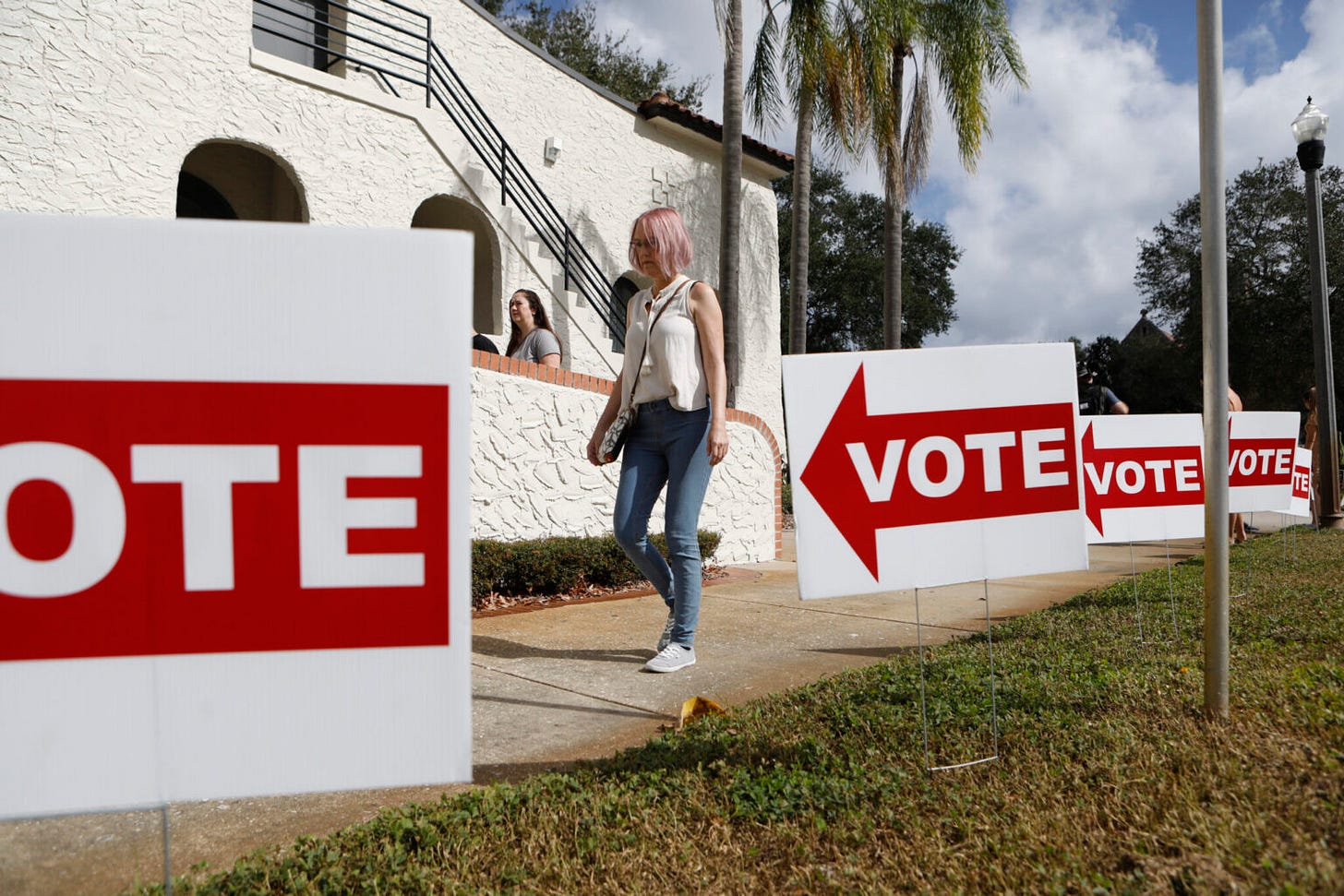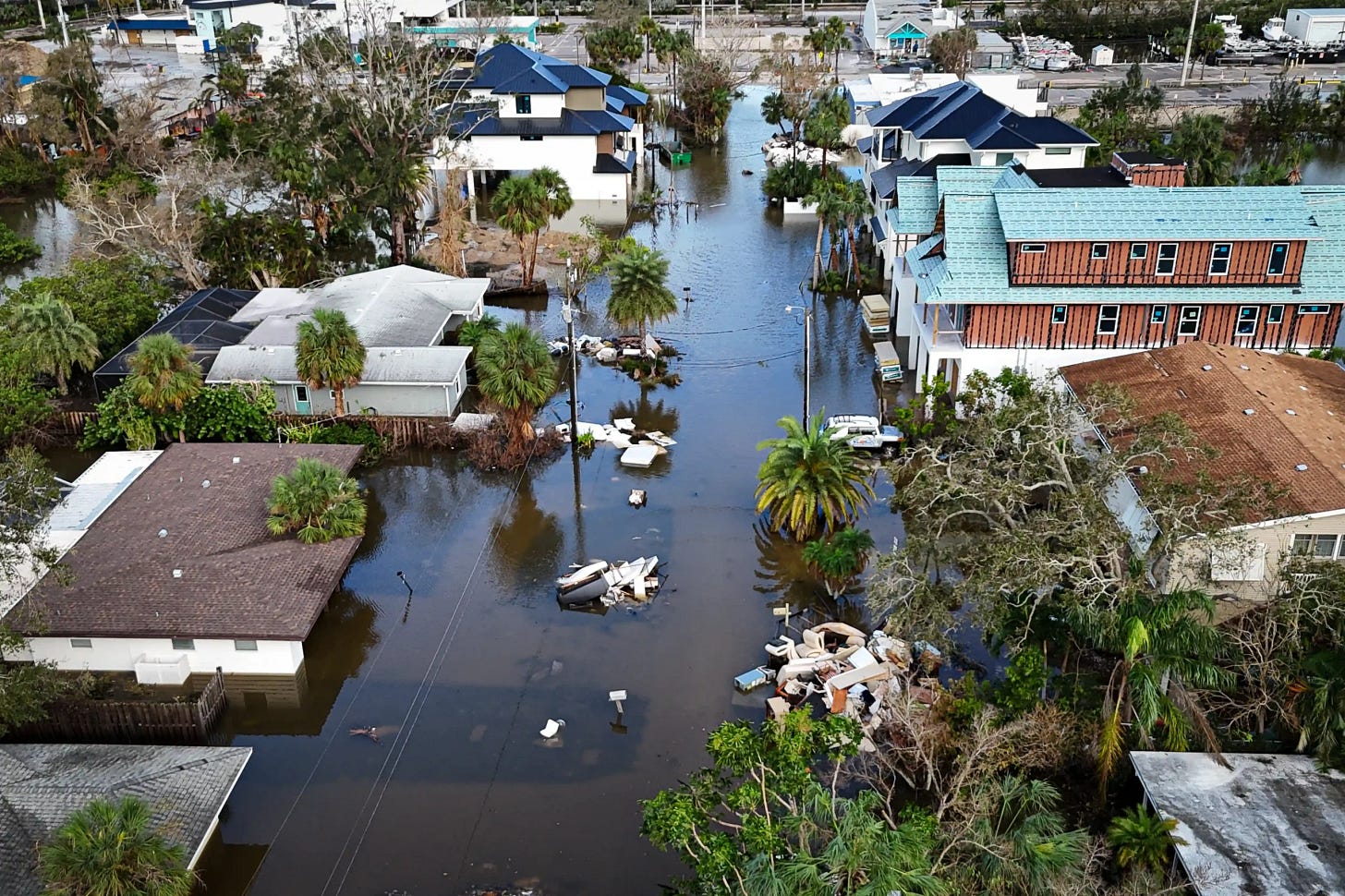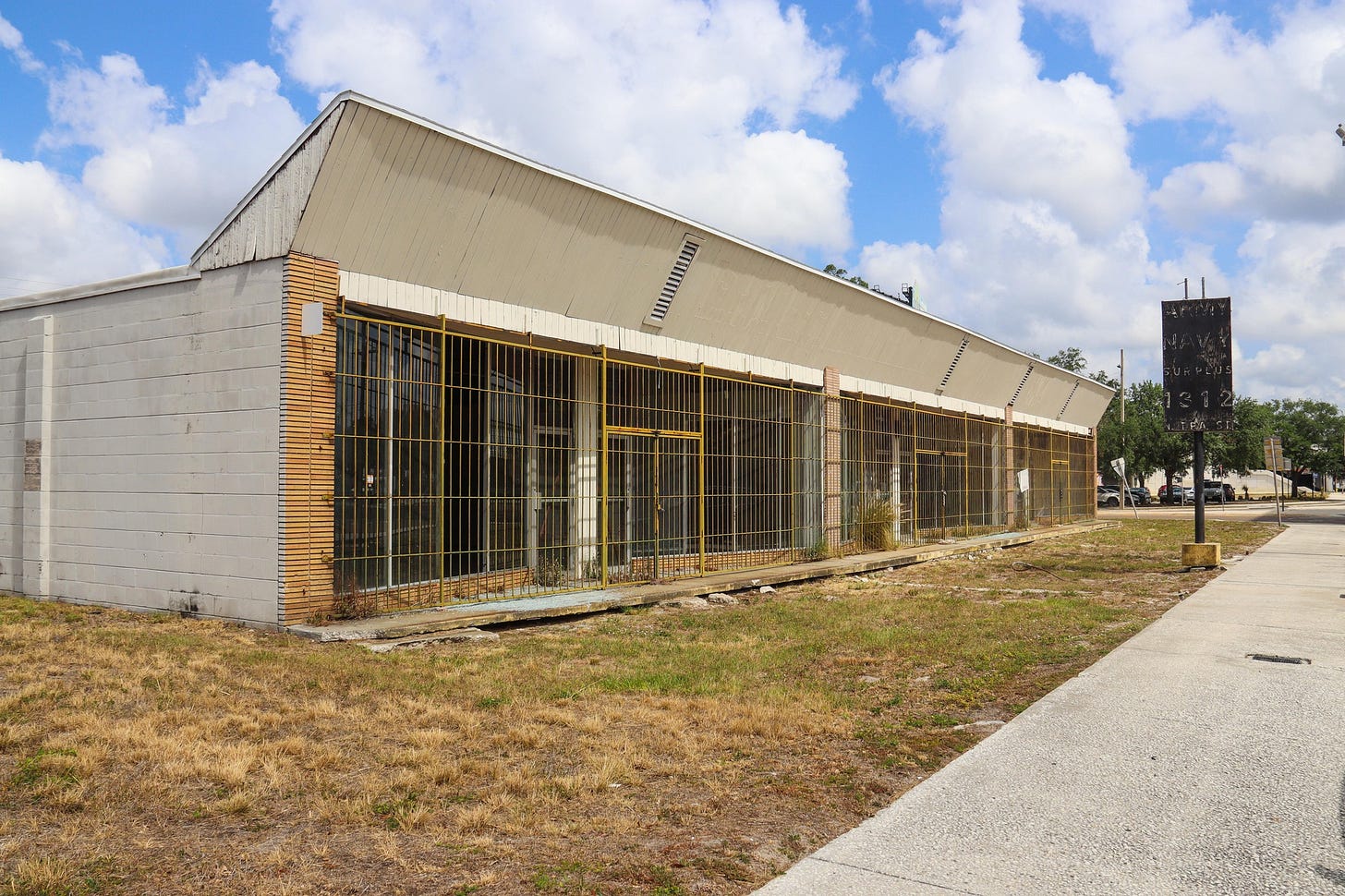New Law Places Stricter Rules for Citizen Ballot Initiatives & Florida Passes Controversial Ban on Weather Modification
May 5, 2025 - This Week's News from Central Florida
Welcome to this week’s edition of the Central Florida Times, an independent, reader-supported newsletter focusing on the Sunshine State. These are the most important stories you need to know from across Central Florida. To never miss an update, subscribe here:
Here’s the latest from Central Florida…
New Law Places Stricter Rules on Citizen Ballot Initiatives
On what was intended to be the final day of Florida’s legislative session, lawmakers passed a bill making it significantly harder for citizens to place constitutional amendments on the ballot—a move swiftly signed into law by Governor Ron DeSantis Friday evening. The sweeping overhaul of the state’s direct democracy system now establishes felony criminal penalties for unregistered individuals collecting more than 25 petition signatures, requires personal identification numbers on petitions, such as a driver’s license number or partial Social Security number, and prohibits non-residents from gathering signatures. The measure also imposes tighter deadlines and steeper fines for submitting forms incorrectly. The new law was a leading priority for DeSantis, but it fell short of his full wish list. The state’s citizen initiative process has historically allowed Floridians to bypass the Legislature and advance major policy changes, such as raising the minimum wage and restoring voting rights for felons. With the more restrictive changes, critics, including voting rights groups, say the legislation deliberately undermines grassroots political action by making it financially unattainable and highly unlikely that any statewide citizen-led initiative would make its way onto the ballot. However, Republican supporters are widely in favor of the reforms, saying it combats petition fraud and protects the state constitution from outside influence. The law also prohibits using public funds to promote or oppose constitutional amendments, addressing concerns about DeSantis' administration using state resources to oppose last year’s ballot initiatives on marijuana legalization and abortion rights. This Florida measure joins similar restrictions passed in numerous states recently.
Florida Passes Controversial Ban on Weather Modification, Geoengineering
The Florida Legislature has passed a controversial bill criminalizing unauthorized weather modification and geoengineering, including cloud seeding and so-called “chemtrail” activity. Senate Bill 56, approved 82-28 by the House, is now headed to Gov. Ron DeSantis, who has publicly supported the measure. The law would make it a third-degree felony—punishable by up to five years in prison and a $100,000 fine—to conduct climate engineering activities or intentionally disperse substances into the atmosphere to alter temperature, weather, or sunlight without state approval. Each violation would be counted separately, potentially leading to steep cumulative penalties. Aircraft operators and controllers face fines up to $5,000 per violation. The Department of Environmental Protection (DEP) must set up an online and email reporting system for suspected violations and investigate credible claims, with the authority to refer cases to health or emergency agencies. Starting October 1, publicly owned airports must submit monthly reports to the Department of Transportation on any aircraft equipped for weather modification, or risk losing state funding. As the legislation navigated the political process, it sparked heated debate, with supporters arguing it’s needed to prevent unauthorized weather manipulation and critics warning it’s fueled by conspiracy theories and could stifle legitimate science. Democratic lawmakers criticized the bill for lacking scientific oversight and potentially overwhelming state environmental and law enforcement authorities with unfounded reports. In March, U.S. Health & Human Services Secretary Robert F. Kennedy Jr. expressed support for the banning of geoengineering in a social media post, stating that this “is a movement every [Make America Healthy Again (MAHA)] needs to support,” referring to the political movement to improve the nation’s health. The legislation follows similar efforts in other states, like Tennessee, to limit airborne chemical dispersal.
Operation Tidal Wave Nets Over 1,100 Arrests in Statewide Immigration Crackdown
Approximately 1,120 undocumented migrants in Florida have been arrested under “Operation Tidal Wave,” a statewide immigration enforcement effort carried out alongside U.S. Immigration and Customs Enforcement (ICE). Gov. Ron DeSantis announced the updated arrest totals late last week, describing the initiative as a national model for immigration enforcement. Conducted over a week beginning on April 21, the operation resulted in the largest single-week arrest total ever made by a state in partnership with ICE, according to the agency’s Deputy Director Madison Sheehan. The effort targeted individuals from countries such as Guatemala and Mexico, and officials said many had ties to criminal organizations, though specific numbers were not released. Of those arrested, 387 individuals had final deportation orders. The Orange County Sheriff’s Office was noted for its significant involvement, although exact figures from the Greater Orlando area remain undisclosed. Operation Tidal Wave involved federal, state, and local agencies working under the 287(g) program, which empowers local law enforcement to assist federal authorities with immigration enforcement. The Orlando Police Department, one of nearly 250 law enforcement agencies in Florida that have signed an agreement with ICE, has arrested more than 1,018 people with federal immigration detainer since January 1, 2025. This compares to 1,016 similar arrests in all of 2024. The crackdown comes amid legal tension surrounding Florida’s immigration laws, including a federal judge’s order temporarily blocking a new state law making it a crime for an undocumented migrant to enter Florida by evading federal immigration officials. Despite ongoing legal challenges, DeSantis expressed confidence that the state’s enforcement efforts would ultimately be upheld in court. The governor also highlighted that more than 80,000 people in Florida have outstanding deportation orders and proposed expanding detention capacity in the state. Officials have signaled that similar operations will continue, with DeSantis stating, “Florida is leading the fight.”
SunRail Extension to Orlando International Airport, Disney Springs Moves Forward
Plans to expand SunRail to serve Orlando International Airport and the region’s top tourist destinations advanced on Thursday with approval of a $6 million study into the proposed Sunshine Corridor. The Central Florida Commuter Rail Commission voted unanimously to fund the two-year Project Development and Environment (PD&E) study, a required step before the state or federal government can consider construction funding. The analysis will assess ridership projections, operational and maintenance costs, environmental impacts, station locations, and route options for the corridor. The envisioned extension would run from existing SunRail tracks east to the airport and west to the Orange County Convention Center, International Drive, and Disney Springs. It would also provide for a future 12-mile segment for Brightline’s planned high-speed rail expansion toward Tampa. Florida Department of Transportation (FDOT) officials estimate the Sunshine Corridor could cost at least $4.4 billion and say local resources alone won’t be enough to cover that price tag. Funding for the study comes from FDOT, the city of Orlando, local counties, and private partners, including Universal Destinations & Experiences. Backers say the expansion would boost regional connectivity and ease traffic congestion near the airport, which sees over 60 million travelers annually. SunRail’s ridership has also grown, with March numbers up 13% from last year.
Lawmakers Vote to Repeal Florida’s Long-Standing ‘Free Kill’ Statute
Florida’s legislature has approved a bill that would overturn the state’s controversial so-called “Free Kill” law, a decades-old statute that has long limited certain families from pursuing wrongful death claims tied to medical malpractice. The law, enacted in 1990, prevented parents of unmarried adults over 25 without minor children from suing for non-economic damages—such as pain and suffering—when those individuals died due to medical negligence. Currently, only surviving spouses and children under 25 can file such claims, allowing doctors to avoid liability for clinical errors regardless of the severity of their mistakes. On Thursday, the Florida Senate voted 33-4 in favor of a full repeal, rejecting a proposed amendment pushed by medical groups that would have imposed damage caps of $1 million. The Florida House had already passed the repeal measure, HB 6017, last month in a 104-6 vote. Supporters, including many who lost loved ones under the existing restrictions, hailed the decision as long overdue. With legislative approval, the bill now heads to Governor Ron DeSantis for consideration. If signed, the repeal would mark a major shift in Florida’s medical liability laws, allowing more families access to civil recourse.
Legislature Approves Sweeping Hurricane Recovery Reforms
In response to the devastating 2024 hurricane season, Florida lawmakers have passed a wide-ranging bill aimed at improving disaster recovery and emergency preparedness. The measure, SB 180, sponsored by Sen. Nick DiCeglie (R-Indian Rocks Beach), received overwhelming approval in the Senate after unanimously passing the House. It now awaits the signature of Gov. Ron DeSantis. The legislation streamlines the rebuilding process for homeowners by simplifying permitting procedures and preventing property tax reassessments on modest home expansions. It also blocks local governments from increasing building or inspection fees for six months following a storm emergency declaration, easing financial burdens during rebuilding and recovery. DiCeglie, whose home was damaged during last year’s hurricanes, said the bill gives families “a clear path to recovery” and reduces red tape in disaster response. Other provisions include mandating local governments to post clear recovery permitting guides, maintain adequate staffing, and establish post-storm permitting plans. The state’s Division of Emergency Management would oversee new statewide readiness training, asset tracking, and improved shelter planning for at-risk individuals. The legislation also emphasizes improved disaster management planning, emergency resource coordination, and financial transparency for state agencies, with new annual reporting requirements on hurricane spending and recovery actions. Lawmakers say these reforms take the lessons learned following hurricanes Helene and Milton to help Floridians rebuild faster and better prepare for future hurricanes.
Lawmakers Pass 'Yes in God's Backyard' Bill to Boost Affordable Housing
A new bill approved by Florida legislators would permit religious institutions to develop affordable housing on their properties, bypassing existing zoning restrictions. The measure, nicknamed "Yes in God's Backyard" (YIGBY), aims to address the state's housing affordability crisis by utilizing church-owned land. The provision is incorporated within Senate Bill 1730, a comprehensive housing package, and includes language advocated by St. Petersburg Mayor Ken Welch and State Representative Lindsay Cross (D-St. Petersburg). Under the legislation, religious institutions would gain authority to develop affordable housing for low- and moderate-income residents on properties containing houses of worship and any adjoining parcels they own. St. Petersburg has already demonstrated the concept's potential, having approved Palm Lake Christian Church's proposal for 86 affordable housing units last year. According to data from the Florida Housing Coalition cited by Mayor Welch, if Governor DeSantis signs the bill into law, it could potentially make more than 30,000 parcels across the state available for affordable housing development.
USF Approves $348M Football Stadium, Eyes Fall 2027 Opening
University of South Florida is moving forward with its long-anticipated on-campus stadium, now carrying a total project cost of $348.5 million—an $8 million increase from initial estimates. Last week, the Board of Trustees gave unanimous approval on the new stadium’s higher price tag that are due to design enhancements, structural upgrades for potential future expansion, and rising construction costs. The project is to be funded through interest earned on previously issued bonds. Set to open in fall 2027, the 35,000-seat stadium will be located on the east side of USF’s Tampa campus and features premium suites, club seating, a rooftop patio, and a field club with glass windows. Plans also include academic space within the facility and the vertical expansion of the Tampa General Hospital Center for Athletic Excellence. The stadium is designed to host not only football and women’s lacrosse but also concerts, NCAA events, and potentially high school championships, with the potential to add up to 15,000 seats in the future. The board also approved $47.9 million in related infrastructure improvements around the stadium. Construction is expected to begin this summer. USF officials believe the stadium will transform the campus experience, fostering a stronger sense of community and spirit.
Tampa Unveils Plan to Transform North Downtown Area
City leaders have launched a redevelopment project for the northern edge of downtown Tampa, reenvisioning underutilized properties into a vibrant area with affordable housing, mixed-use spaces, and enhanced pedestrian connectivity. The plan encompasses four acres of land, including the former Army-Navy Surplus Market site on N. Tampa Street, and calls for at least 750 housing units, with half designated as affordable. Mayor Jane Castor emphasized the collaborative effort behind the project, calling it “long-term planning and teamwork involving state and local partners” and highlighting its potential to strengthen the city’s urban core. The plan also proposes redesigning the Ashley Drive on-ramp to I-275 to improve pedestrian and cyclist safety, and possibly extending the TECO Line Streetcar to Palm Avenue to boost transit options. Located near cultural landmarks like the Tampa Theatre and Straz Center, the project is part of the broader “Transforming Tampa’s Tomorrow” initiative, which includes other major redevelopment efforts across the city like Ybor City’s Gasworx and West Tampa’s Rome Yard. Developers must submit proposals by June 13, 2025, with city officials set to select a finalist soon after.
Florida GOP Pressures Counties to Ease Property Tax Burdens Immediately
The Republican Party of Florida has announced a new campaign urging counties to adopt the rollback rate to ease rising property tax burdens. Dubbed #RollbackNOW, the initiative targets record tax revenue increases seen across the state—some exceeding 50% since 2019. Party Chairman Evan Power said surging home values have caused sharp tax hikes, hurting retirees and those on fixed incomes. “Floridians are fed up with high property taxes eroding the American Dream,” Power said. The rollback rate would lower tax collections to prior-year levels, offsetting inflated property values while preserving essential services. The GOP argues it offers quick relief by curbing unnecessary spending at the local level. “#RollbackNOW delivers immediate, meaningful relief to Florida families—not next year, but now,” Power added. The initiative comes just days after House Speaker Daniel Perez (R-Miami) created a Select Committee on Property Taxes to craft detailed proposals by January 2026, with the goal of placing a constitutional amendment on the November 2026 ballot. Since February, Governor Ron DeSantis has publicly called for lawmakers to abolish property taxes.
Thanks for reading this edition of the Central Florida Times. To never miss an update, subscribe for free:
In the meantime, if you learned something or found this read interesting, please consider sharing it to grow our community!











